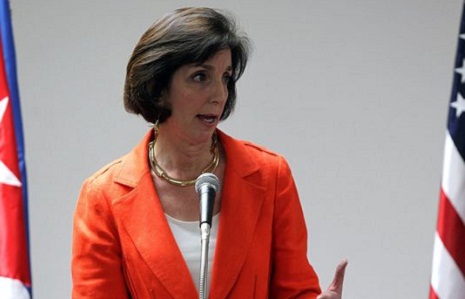Ever since they agreed in 1977 to open Interests Sections in Washington and Havana to establish basic consular services, the two sides have closely monitored each other`s diplomats, restricted their travel and, at times, expelled them. Cuban and American diplomats have accused their host governments of spying on them, intercepting their packages and making it nearly impossible for them to do their work.
"It`s going to be a long road," said James Cason, a former chief of mission at the U.S. Interests Section in Havana.
The talks were sparked by the surprise December announcement by President Obama and Cuban President Raúl Castro, who said the countries would move toward formal diplomatic relations, and open more trade and travel. U.S. Assistant Secretary of State Roberta Jacobson led the American delegation for the first round of talks in Havana last month and will continue that role on Friday. Josefina Vidal, head of the Foreign Ministry`s North American affairs division, will head the Cuban delegation.
The two will have a long list of issues to resolve, including travel restrictions placed on diplomats. Right now, Cuban officials in Washington cannot travel outside the Beltway, a freeway that rings the district`s close suburbs, without first obtaining special permission from the State Department. American officials in Havana must also seek special permission to travel outside Havana.
Even receiving shipments from their home country has been difficult. For years, Americans working in Havana have complained that Cuban officials have made it difficult to import goods from light bulbs to air-conditioner parts.
"(The shipments) would stay on the port for months, they would open stuff, some things would disappear," said Frank Mora, a former deputy assistant secretary at the U.S. Department of Defense. "Just silliness. That has to end."
Cason said those intrusions would extend to the diplomatic pouches that countries generally allow to travel freely. He said he would routinely have short-wave radios and books on democracy shipped to him for distribution to Cubans. Once the Cuban authorities realized what he was doing, Cason said, they passed each pouch under an X-ray machine and sent it back if they saw radios or books inside. "So I used to put lead bags inside the shipments so they couldn`t see what we had inside," he said.
Vicki Huddleston, a former chief of mission in Havana, said both sides also have to limit the amount of surveillance on each other`s diplomats.
While serving in Havana, she could see cameras trained on the U.S. Interests Section and the person using a telescope to peer into her official residence. She said it was common for Cubans to enter the homes of diplomats to install listening devices, check their computers and see what they could find.
The Cubans will come with their own set of demands, chief among them their continued inclusion on the U.S. State Department`s State Sponsor of Terrorism list. When Obama announced the new relationship, he ordered a review to determine whether Cuba should be removed from the list.
More about:
















































